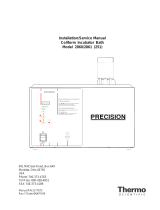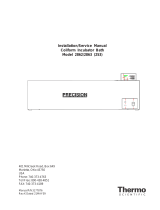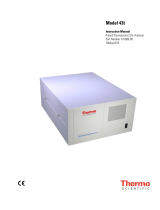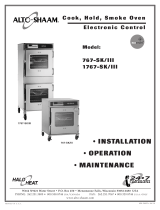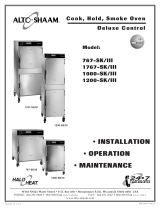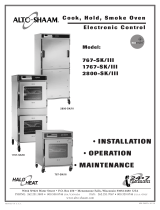Page is loading ...

401 Millcreek Road, Box 649
Marietta, Ohio 45750
USA
Phone: 740-373-4763
Toll Free: 800-848-3080
FAX: 740-373-4189
Manual P/N 3177877
Rev I Dated 29OCT09
Installation and Operation Manual
Microprocessor-Controlled
General Purpose Water Baths
Models
280 (2825/2826), 281 (2829/2830), 282 (2833/2834),
283 (2837/2838), 284 (2841/2842), 285 (2845/2846),
286 (2849/2850) and 288 (2853/2854)
Press ENTER - New Set Point is accepted.
Display will then return to actual temperature.
Should Calibration Be Required:
Place certified / traceable thermometer into holder.
Press ENTER - calibration is complete.
Off
On
Heater On
Calibrate
ENTER
To Set Temperature:
Allow to stabilize.
Press Calibrate button.
Press or until desired temperature is displayed.
56
Press or to match readout to thermometer.
56

NOTICE
THE MATERIAL IN THIS MANUAL IS FOR INFORMATION PURPOSES ONLY. THE CONTENTS AND THE
PRODUCT IT DESCRIBES ARE SUBJECT TO CHANGE WITHOUT NOTICE. THERMO SCIENTIFIC MAKES
NO REPRESENTATIONS OR WARRANTIES WITH RESPECT TO THIS MANUAL. IN NO EVENT SHALL
THERMO BE LIABLE FOR ANY DAMAGES, DIRECT OR INCIDENTAL, ARISING OUT OF OR RELATED TO
THE USE OF THIS MANUAL.
For repair information or replacement parts assistance from the manufacturer,
call Technical Services using our toll free telephone number.
800-438-4851
(FAX) 740-373-4189
NOTE:
THE 240V UNITS DESCRIBED IN THIS MANUAL WERE DESIGNED SPECIFICALLY FOR THE EUROPEAN
MARKET AND ARE SUPPLIED WITH A EUROPEAN STYLE POWER CORD. FOR DOMESTIC USE, A U.S.
STYLE POWER CORD (P/N: 3176836) MUST BE ORDERED SEPARATELY.
Table 3.1 Listing of Models Included in this Manual
Model
Number Catalog
Number
Electrical Characteristics Capacity 240V Units
Mains Fuse
Volts Watts Amps Liters Gallons
2825/
2826 3166686
3166687 120
240 225 1.9
11.5 0.4 FST-5x20-1.0A
2829/
2830 3166688
3166689 120
240 225 1.9
12.5 0.7 FST-5x20-1.0A
2833/
2834 3166690
3166691 120
240 300 2.5
1.3 5.5 1.5 FST-5x20-2.0A
2837/
2838 3166692
3166693 120
240 400 3.3
1.7 12.0 3.2 FST-5x20-2.0A
2841/
2842 3166694
3166695 120
240 600 5
2.6 19.5 5.2 FST-5x20-3.15A
2845/
2846 3166696
3166697 120
240 600 5
2.6 18.0 4.9 FST-5x20-3.15A
2849/
2850 3166698
3166699 120
240 1200 10
5.2 43.0 11.4 FST-5x20-6.3A
2853/
2854 3166700
3166701 120
240 800 6.7
3.5 12.0* 3.2* FST-5x20-3.15A
* Each chamber
For all 240V models: Power Supply Board Fuse - FST-5x20-6.3mA

Initial release
12/98
A
INDEX DATE AMENDED PAGES NOTES
REVISION STATUS
Pictorial update of wiring per
ECO JGC000223A
02/00
B17
updated electrical secifications
C07/01 2,8,9,12,17
D
E
F
G
H
I
NOV01
4/05
5/06
1/08
9/08
10/09
Add caution "acidic & caustic substance"
new manual #, manufacture location
consolidated with the 240V manual
3177693, updated specs
Added warning not to operate without
water in the bath.
Revised water specifications
temp performance with gable only
5
36100112 (340016400)
ECR 23443 & 23496
ECR 24361
ECR 24808
ECR25795/BA-684

Contents
1. Introduction..................................................................................................................... 1
2. Unpacking and Damage ................................................................................................ 1
3. General Information ........................................................................................................ 2
4. Performance Data ........................................................................................................... 3
5. Installation ....................................................................................................................... 3
6. Explanation of Controls ................................................................................................. 4
7. Operation ......................................................................................................................... 5
8. Maintenance .................................................................................................................... 6
9. Troubleshooting ............................................................................................................. 7
10. Parts Replacement ..................................................................................................... 10
11. Replacement Parts List .............................................................................................. 12
12. Assembly and Schematic Drawings ......................................................................... 14
13. Warranty ...................................................................................................................... 19


1
2.0 UNPACKING AND DAMAGE
2.01 This product was carefully packed and
thoroughly inspected before leaving our
factory. Save all packing material if apparatus
is received damaged.
2.02 Responsibility for safe delivery was assumed
by the carrier upon acceptance of the
shipment; therefore, claims for loss or damage
sustained in transit must be made upon the
carrier by the recipient as follows:
Visible Loss or Damage: Note any external
evidence of loss or damage on the freight bill
or express receipt, and have it signed by the
carrier's agent. Failure to adequately describe
such external evidence of loss or damage
may result in the carrier's refusing to honor
your claim. The form required to file such
claim will be supplied by the carrier.
Concealed Loss or Damage: Concealed
loss or damage is any loss or damage which
does not become apparent until the
merchandise has been unpacked and
inspected. Should either occur, make a written
request for inspection by carrier's agent within
15 days of the delivery date; then file a claim
with the carrier.
2.03 If you follow the above instructions carefully,
Thermo will guarantee our full support of your
claim to be compensated for loss or damage
in transit.
DO NOT — for any reason — return this
unit to Thermo without first obtaining
return authorization. In any correspondence
with Thermo, please supply the nameplate
data, including catalog number and serial
number.
1. 0 INTRODUCTION
1.01 Your satisfaction and safety are important to
Thermo and a complete understanding of this
unit is necessary to attain these objectives.
1.02 As the ultimate user of this apparatus, you
have the responsibility to understand its proper
function and operational characteristics. This
instruction manual should be thoroughly read
and all operators given adequate training
before attempting to place this unit in service.
Awareness of the stated cautions and
warnings, and compliance with recommended
operating parameters — together with
maintenance requirements—are important
for safe and satisfactory operation. The unit
should be used for its intended application;
alterations or modifications will void the
warranty.
WARNING
AS A ROUTINE LABORATORY PRECAUTION,
ALWAYS WEAR SAFETY GLASSES WHEN
WORKING WITH THIS APPARATUS.
1.03 This product is not intended, nor can it be
used, as a sterile or patient connected device.
In addition, this apparatus is not designed for
use in Class I, II, or III locations as defined by
the National Electrical Code.

2
3.0 GENERAL INFORMATION
3.01 Precision Baths are widely used in research
and quality control. Their superb temperature
uniformity and stability makes them especially
desirable for legal or reference tests.
CAUTION
DO NOT APPLY POWER TO THE WATER BATH
BEFORE FILLING THE WATER BATH PAN WITH
THE RECOMENDED WATER SOLUTION (SEE
SECTION 7.02). OPERATING THE BATH
WITHOUT A WATER SOLUTION COULD RESULT
IN OVERHEATING AND DAMAGE TOT HE
HEATER.
3.02 The microprocessor control panel houses all
functions necessary to operate the bath.
The push-button keys and single display
window allows the operator to adjust bath
temperature and temperature calibration via
a single set of controls.
3.03 The Proportional Integral Derivative (PID)
temperature control allows precise
temperature control. Use of the gable cover
provided is required to maintain optimal
temperature sensitivity.
3.04 A high limit temperature cutout is provided in
the event of an empty water bath. If the sensor
reads a temperature 5°C higher than the set
temperature, a high temperature cutout will
occur indicated by a display reading of "EEE,"
and the heater will be inhibited from operating.
To reset the bath, the power must be turned
off and then back on again. The high limit
temperature cutout is internally set for 5°C
above any set temperature and can not be set
by the user.
3.05 The interior of the bath is constructed of
stainless steel and is designed for operation
with distilled water or water solutions, such
as water ethylene glycol with corrosion
inhibitor's added. The body is made from
galvanized steel and is painted for added
protection. A gable cover is also provided
with the bath.
3.06 The 240-volt units are identical in appearance
to the 120-volt units.
NOTE:
USING CHLORINATED TAP WATER OR ADDITIVES
THAT CONTAIN CHLORINE WILL VOID THE
MANUFACTURER'S WARRANTY. SIMILARLY, HIGH
PURITY (DEIONIZED) WATER THAT DOES NOT FALL
WITHIN THE RESISTIVITY RANGE OF 50K TO 1M
OHM AND THE PH RANGE FROM 7 TO 9 WILL VOID
THE WARRANTY. CONTACT TECHNICAL SERVICES
WITH ANY QUESTIONS.

3
5.02 Electrical Connections -
WARNING
FOR PERSONAL SAFETY, THIS APPARATUS MUST
BE PROPERLY GROUNDED.
1. The power cord provided on this unit is
equipped with a three-prong (grounding) plug
which mates with standard three-prong
grounding wall receptacle to minimize the
possibility of electric shock hazard from this
apparatus. If in doubt the user should have the
wall receptacle and circuit checked by a
qualified electrician to make sure the
receptacle can provide adequate current and
is properly grounded.
2. Where a standard two-prong wall receptacle
is encountered, it is the personal responsibility
and obligation of the user to have it replaced
with a properly grounded three-prong wall
receptacle. Do not, under any
circumstances, cut or remove the third
(ground) prong from the power cord. Do
not use a two-prong adapter plug.
5.03 Determine the total amount of current being
used by other apparatus connected to the
circuit that will be used for this apparatus. It
is critical that the added current demand (see
nameplate) of this and other equipment used
on the same circuit does not exceed the
rating of the fuse or circuit breaker.
Environmental Conditions-
This instrument is designed to operate safely under
the following conditions:
•Indoor Use Only
•Temperature: 5° to 40° C
•Maximum Relative Humidity: 80% for
temperatures to 22°C
•Maximum Altitude 2000 meters
Maximum performance is assured across the
following temperature range:
•15ºC to 45ºC
CAUTION
• BE SURE THAT THE POWER SUPPLY IS OF THE
SAME VOLTAGE AS SPECIFIED ON NAMEPLATE.
• BE SURE THAT THE WALL RECEPTACLE IS
READILY IDENTIFIABLE AND EASILY REACHED
TO DISCONNECT UNIT FROM POWER SOURCE.
DIFFUSER PAN
LEG EXTENSION KIT
4.0 PERFORMANCE DATA
4.01 The following performance specifications
for bath models 280 through 288 are valid only
when the gable cover is in place.
Control sensitivity @ 37C = ±0.1C
Temperature uniformity @ 37C = ±0.2C
Minimum bath temperature = Ambient +5C
Maximum bath temperature
5.0 INSTALLATION
WARNING
INSTALLATION SHOULD BE COMPLETED BY
QUALIFIED PERSONNEL ONLY.
5.01 1. The most uniform operating conditions and
results will be obtained by placing the bath on
a level surface in an area remote from drafts,
ventilating outlets, radiators, and other rapidly
changing ambient conditions.
2.Place the stainless steel metal shelf
(corners facing downward) inside the bath
chamber. The shelf (Diffuser Pan) provides
a sample base and protects samples from
touching the hot metal bath bottom. If it is
necessary to increase the height of the diffuser
pan, a Leg Extension Kit is included for this
purpose, except for the Model 2829/2830.
Following the figure shown below, attach the
4 extension legs to each of the four corners of
the diffuser pan.

4
Place certified / traceab le thermometer into holder.
Press ENTER - calibration is complete.
Press or to match readout to thermometer.
Off
On
ENTER
Press Calibrate button.
Allow to stabilize.
Should Calibration Be Required:
Display will then return to actual temperature.
Press ENTER - New Set Point is accepted.
Press or until desired te mpe rature is displayed.
Calibrate
Heater On
To Se t Te mp e r ature:
6.0 EXPLANATION OF
CONTROLS
6.01 Power Switch - The power switch is located
near the lower portion of the control panel
and provides power to the entire unit.
6.02 Control Panel - The Control Panel provides
a digital readout of temperature readings,
heater on indicator, and keys for user to
make their desired selections.
1. LED Display - Three digits are used to
display the actual, set, and calibrated values
for temperature.
2. Heater On Lamp - The "HEATER ON" lamp
is lit when power is applied to the heater.
3. Calibrate Key - This key puts the unit in
calibrate mode to match a traceable
thermometer to the actual temperature
display.
4. Temperature Selection Keys - These keys
are used to increase or decrease the setpoint
and/or calibrate temperature selections.
5. Enter Key - The enter key is used to store a
new setpoint or calibration value.
1
2
3
4
5

5
7.0 OPERATION
CAUTION:
EXERCISE CARE WHEN USING ACIDIC OR
CAUSTIC SOLUTIONS AS THEY WILL ATTACK
THE GALVANIZED STEEL BATH BODY IF SPILLED
INTO THE BATH. IF SPILLS DO OCCUR, THE
BATH LIQUID SHOULD BE IMMEDIATELY
DRAINED AND THE UNIT THOROUGHLY
FLUSHED. SPILLS AND CONDENSATION SHOULD
BE CLEANED/REMOVED FROM ALL METAL
SURFACES AFTER EACH USE.
7.01 When filling the bath with water, allowance
must be made for the displacement of water
upon immersion of samples. The maximum
liquid level is 1 inch below the top of the pan.
7.02 To conserve energy, reduce evaporation,
increase temperature control accuracy, and
reach/maintain 100°C, use the gable cover
provided. Do not use aluminum foil as a
cover, as it may cause corrosion due to an
electrochemical reaction.
1. Add distilled water to bath. The water level
should be no closer than 1" from the top of the
bath when the bath is fully loaded. NOTE:
Use sterile distilled water only. The
acceptable resistivity range is 50K to 1M
ohms (conductivity 1 to 20 mico Siemens).
The acceptable pH range is 7 to 9.
2. Power up: Depress the power switch located
at the lower end of the control panel.
Immediately after turning on power, all of the
segments of the display will be on along with
the HEATER ON indicator. After 3 seconds,
the current set temperature will be displayed
and this will last for 5 seconds. Then the
display will change to the actual bath
temperature.
3. To display the set temperature, quickly press
the /\ (up) or \/ (down) key. The current set
temperature will be displayed. After 5 seconds,
the display will return to the actual bath
temperature.
4. To change the set temperature, continuously
press the /\ or \/ key until the desired set
temperature is displayed. When continuously
pressing either the /\ or \/ keys, the display
changes slowly at first but after 1 degree has
passed, the display begins to change rapidly.
After the desired set temperature is achieved,
then press the ENTER key. The display with
the new set temperature will flash three times
and then it will return to the bath temperature.
If the ENTER key is NOT pressed, the
expected new set temperature will not be
accepted and the water bath will control at the
previous set temperature.
5. The water baths are calibrated at the factory
for use over a wide range of temperatures.
Due to non-linearities in the control system, it
may be necessary to make the display match
a calibrated thermometer's reading, even
though the difference might be only a few
tenth's of a degree.
The calibrate function should be used only to
match a STABLE bath's actual temperature
to the calibrated thermometer.
To perform calibration, press the CALIBRATE
key. The display changes to CAL, then flashes
back to bath temperature. This occurs four
times, if no other keys are pressed, then it
resumes displaying the bath temperature.
After inserting a calibrated thermometer into
the holder and letting it stabilize for a minimum
of 15 minutes, note its reading.
Press the CALIBRATE key once again and
while the display is flashing, press either the
/\ or \/ key to make the display match the noted
thermometer reading. After the desired display
is achieved, press the ENTER key. The display
flashes three times with the adjusted reading,
then stops flashing. The bath is now calibrated
more accurately for the control set point.
WARNING
EXPLOSION, IMPLOSION OR THE RELEASE
OF TOXIC OR FLAMMABLE GASES ARISING
FROM THE MATERIAL BEING HEATED IS THE
SOLE RESPONSIBILITY OF THE USER.

6
8.0 MAINTENANCE
8.01 Cleaning and care of stainless steel: Stainless
steel will resist corrosion; however, it is not
impervious to it. For maximum life, stainless
steel must receive a certain amount of care.
CAUTION
AVOID SPILLING HARSH CHEMICALS ONTO THE
BATH, AS CORROSION OF THE STAINLESS
STEEL MAY RESULT.
1. There are many chemical cleaners, but usually
just changing the water and periodic cleaning
with mild soapy water or a non-scratching
scouring power will suffice.
Should algae or other undesirable
microorganisms form on the top of the bath
media, add a little formaldehyde or zephiran
chloride to alleviate this problem.
CAUTION
ELECTROLYSIS CAN DAMAGE STAINLESS STEEL.
THIS CAN OCCUR IF AN OBJECT IS ALLOWED TO
REST DIRECTLY ON THE SURFACE, TRAPPING
MOISTURE THAT BECOMES OXYGEN STARVED
BUT IS SURROUNDED BY WATER CONTAINING
OXYGEN. THE RESULTING ELECTROLYTIC ACTION
WILL PIT OR ERODE THE STAINLESS STEEL.
2. Should it be necessary to use a media other
than water such as those listed below, limit
the time to a maximum of four hours. Clean
surfaces immediately after use.
Aluminum Chloride Barium Chloride
Bichloride of Mercury Calcium Chloride
Carbolic Acid Chlorinated Lime
Citric Acid (boiling) Dakin's Solution
Ferrous Chloride Mercury Salts
LysolMercuric Chloride Phenol
Potassium Permanganate Stanous Chloride
Sodium Hypochlorite Tartaric Acid
Potassium Thiocyanate
3. Should the stainless steel ever become
discolored by iron rust, use the following
procedure to remove all traces of the rust and
restore the stainless steel.
WARNING
ALWAYS OBSERVE THE FOLLOWING SAFETY
PRECAUTIONS! USE HEAVY GLOVES OR OTHER
ADEQUATE HAND PROTECTION. WEAR GOGGLES
OR OTHER ADEQUATE EYE PROTECTION. WORK
ONLY IN AREAS WITH ADEQUATE VENTILATION.
Prepare a solution of 20% nitric and 1.5%
hydrochloric acid (if preferred, a 2% to 5%
solution of warm oxalic acid may be used).
Swab solution over surface, allowing it to
remain until all rust is loosened. This will
usually take 1 to 2 minutes.
As soon as rust is loosened, immediately
flush with clean water until all acid is removed.
Dry thoroughly.
4. During operation, quite a bit of condensation
forms on the inside of the gable cover. When
removing the gable cover, have one of its
corners centered above the water bath, so
that the water runoff goes into the bath.
Shaking the cover aids the water runoff. Be
sure to wipe up any water spillage on or
around the bath.
IMPORTANT
THE USER HAS THE RESPONSIBILITY FOR
CARRYING OUT THE APPROPRIATE
DECONTAMINATION IF HAZARDOUS MATERIAL IS
SPILLED ON OR INSIDE THE BATH.
CAUTION
NEVER USE THE FOLLOWING CHEMICALS:
AQUA REGIA FERRIC CHLORIDE IODINE
SODIUM AZIDE SULFURIC ACID

7
Troubleshooting Procedures
Problem Procedure
9.02 The following is a list of the tools and
instruments required to perform the
procedures outlined in the Troubleshooting
Procedures table.
Suggested Tools:
• Phillips Screwdriver
• 7/16" Socket or adjustable wrench
• Ohmmeter
• DC Voltmeter
• AC Voltmeter
• 5VDC Power Supply
• Nut Driver 11/32"
9.0 TROUBLESHOOTING
WARNING
SERVICE SHOULD BE PERFORMED BY A QUALIFIED
TECHNICIAN. BEFORE REPLACING ANY
ELECTRICAL OR MECHANICAL COMPONENTS,
UNPLUG THE LINE CORD. IF ELECTRICAL POWER
IS REQUIRED FOR SERVICE, USE EXTREME CARE.
9.01 Refer to Troubleshooting Procedures Table
(9.03 through 9.06) for troubleshooting
information on the baths. This table provides
the basic information required to repair the
bath.
9.03 No Heat 1. Verify that setpoint temperature is greater than the actual
water temperature.
2. Check temperature probe.
A. Disconnect unit from electrical supply.
B. Disconnect temperature probe connector J5 from Control
Board.
C. Place 5 volt DC between Pins 1 & 3 on temperature probe
connector.
D. Place a voltmeter between Pins 2 & 3 on temperature
probe connector. Place the temperature probe in a bath
of known temperature. Verify that the output voltage of
the temperature probe approximately corresponds to the
values in the table below.
Degrees Centigrade vs. Output Voltage of Temperature
Probe
Temp °C Vout Temp °C Vout
0 320mV 60 1.400V
10 500mV 70 1.580V
20 680mV 80 1.760V
30 860mV 90 1.940V
40 1.040V 99.9 2.218V
50 1.220V

8
9.03 No Heat (cont.)
Troubleshooting Procedures
Problem Procedure
E. If a 5V DC power supply is not available, leave J5 connected
to the control board, turn power on, and repeat step D by
placing the voltmeter probes on J5, Pins 2 & 3.
4. Check Heater.
A. Disconnect unit from electrical supply.
B. Obtain access to the heater by removing the bottom cover
and then removing the insulation. The heaters have red and
white wires connected to them from the control board.
Disconnect the red wire from the heater to isolate it from the
board. Connect an ohm meter across the heater. Then using
the chart below, determine which reading you should obtain
depending on the model. On most of the 240-volt models,
there are two separate heaters which are connected in
series. The values below are approximate. If the resistance
varies more than ±20% from these listed values, then the
heater should be replaced.
280-120V 60 Ohms
280-240V 260 Ohms
281-120V 60 Ohms
281-240V 260 Ohms
282-120V 48 Ohms
282-240V 196 Ohms Total (98 Ohms each)
283-120V 35 Ohms
283-240V 140 Ohms Total (70 Ohms each)
284-120V 25 Ohms
284-240V 100 Ohms Total (50 Ohms each)
285-120V 25 Ohms
285-240V 100 Ohms Total (50 Ohms each)
286-120V 25 Ohms
286-240V 100 Ohms Total (50 Ohms each)
288-120V 35 Ohms
288-240V 140 Ohms Total (70 Ohms each)
Re-connect the red wire back to the heater.

9
9.06 No Display
9.05 Too much heat
Troubleshooting Procedures
Problem Procedure
9.04 Unstable temperature control
5. Check TRIAC (High voltage output of control board)
A. Make sure power is disconnected from the unit.
B. Connect an AC voltmeter across the heater capable of
reading 120 or 240 volts, depending on your particular unit.
C. Turn power on and select a set point higher than the actual
temperature to get the HEATER ON indicator to illuminate.
With the HEATER ON indicator lit, there should be either
120 or 240 volts across the heater. If not, the control board
should be replaced.
1. Use gable cover provided to improve temperature control.
2. Verify that temperature setpoint is set at desired value.
3. If control is stable, but not at desired temperature, check set
temperature or perform calibration (Paragraph 7.0, Step 5).
4. Check Temperature Probe (see Paragraph 9.03, Step 2).
1. Check Temperature Probe (see Paragraph 9.03, Step 2).
2. Check TRIAC (see Paragraph 9.03, Step 5).
1. Verify that the water bath is plugged in.
2. Verify that Power switch is in the on position.
3. Disconnect unit from the electrical supply, gain access to the
control board and check Fuse 1 located near the transformer
on the control board.

10
10.0 PARTS REPLACEMENT
WARNING
BEFORE REPLACING ANY PART, BE SURE BATH IS
DISCONNECTED FROM POWER SOURCE. SERVICE
SHOULD BE PERFORMED BY A QUALIFIED
TECHNICIAN.
10.01 Before removing any parts for replacement,
verify part in question by following the
instructions listed in the troubleshooting
guide.
10.02 Refer to Parts Replacement Table below for
appropriate replacement procedures. Failure
to follow parts replacement procedures may
cause damage to the bath.
1. Remove the necessary screws to remove the bottom pan
from underneath the water bath. Then remove the insulation
necessary to view the temperature sensor and its orientation
when connected to the control board.
2. Disconnect the sensor from the control board at J5.
3. The temperature sensor is mounted to the pan with a steel clamp.
Loosen the nut that holds the clamp which in turn holds the sensor
in place. Note that the sensor has its flat side against the pan. When
installing a new sensor, it is important to do the same.
4. Reverse the procedure to install the new sensor.
5. Recalibrate the water bath with the new sensor. See Section
7.0 Operation, Step 5.
1. Remove the necessary screws to remove the bottom pan
from underneath the water bath. Then remove the insulation
necessary to gain access to the heater(s).
2. Disconnect the wires that are attached to the heaters.
3. Using a 11/32" nut driver, remove the nuts that hold the
heater brackets in place.
4. Replace the heater(s), heater brackets, and re-attach the wires.
1. Remove the necessary screws to remove the bottom pan
from underneath the water bath. Then remove the insulation
necessary to gain access to the control board, and hex nuts
which hold the bath pan to the body.
Parts Replacement
10.04 Replace Heater
10.05 *Replace Control Board
10.03 Replace Temperature Sensor

11
Parts Replacement (cont.)
2. Disconnect the wires that are attached to the heater.
Then disconnect the temperature sensor from J5 on the
control board.
3. Remove the bath pan from the body by removing each
11/32" nut from each corner of the pan. NOTE: Model
2849/2850 has 6 hex nuts which hold the pan in place.
4. Disconnect J1 and J2 from the control board.
5. Remove the 4 nuts that support the board. Remove the
control board and replace it, then reverse this procedure.
10.05 Replace Control Board (cont.)
10.06 Replace Diffuser Pan Leg
Extension 1. Attach the four extension legs to each of the four corners
of the diffuser pan using the nut, splitwasher and screw
provided. Refer to figure shown on page 3 of this
manual.
*CAUTION
When replacing the Control Board #3176801, note the following:
1. For 120 Volt models, JP3 and JP4 must be installed.
2. For 240 Volt models, JP3 and JP4 must be removed.

12
11.0 Replacement Parts List
120-Volt Models
2825 2829 2833 2837 2841 2845 2849 2853
Pan 3177554 3177576 3177572 3177573 3177577 3177574 3177578 3177573
Diffuser Plate Asm. 3163798 3163797 3163798 3163801 3163799 3163805 3163804 3163801
PCB Asm. 3176801
Heater 3175493 3175493 3175494 3175495 3175496 3175496 3175496 3175495
Heater Harness 3176805
Power Harness 3176807
Temp. Probe
Assembly 3177640
Heater Insulator 3177733 3177733 3177734 3177735 3177736 3177736 3177736 3177735
On/Off Switch 3175318
Leg Extension Kit 3161440
Line Cord 3178034
Gable Cover 3166202 3161572 3166202 3166203 3166206 3166217 3166218 3166203
240-Volt Models
2826 2830 2834 2838 2842 2846 2850 2854
Pan 3177554 3177576 3177572 3177573 3177577 3177574 3177578 3177573
Diffuser Plate Assy. 3163798 3163797 3163798 3163801 3163799 3163805 3163804 3163801
PCB Assy. 3176801
Heater 3175487 3175487 3175476 3175477 3175478 3175478 3175478 3175477
Heater Harness 3176806
Power Harness 3176808
Temp. Probe Assy. 3177640
Heater Insulator 3177733 3177733 3177734 3177735 3177736 3177736 3177736 3177735
On/Off Switch 3175318
Leg Extension Kit 3161440
Line Cord 3176551
Mains Fuse 3172453 3172453 3172461 3172461 3172442 3172442 3172449 3172442
Controller PCB Fuse 3175929
Gable Cover 3166202 3161572 3166202 3166203 3166206 3166217 3166218 3166203

13
12.0 ASSEMBLY & SCHEMATIC DRAWINGS
Press Calibrate button.
To Set Temperature:
Press ENTER - calibration is complete.
Press or to match readout to thermometer.
Place certified / traceable thermometer into holder.
Should Calibration Be Required:
Display will then return to actual temperature.
Press ENTER - New Set Point is accepted.
Press or until desired temperature is displayed.
Off
On
ENTER
Heater On
Calibrate
Allow to stabilize.
DETAIL "A"
BOTTOM
COVER
TYPICAL FRONT VIEW
POWER SWITCH
PAN
BATH BODY

14
120V UNIT TYPICAL REAR VIEW
GLASSWOOL
INSULATION
THERMOMETER
HOLDER
POWER LINE
CORD

15
240V UNIT TYPICAL REAR VIEW
GLASSWOOL
INSULATION
THERMOMETER
HOLDER
POWER LINE
CORD RECEPTACLE
/
